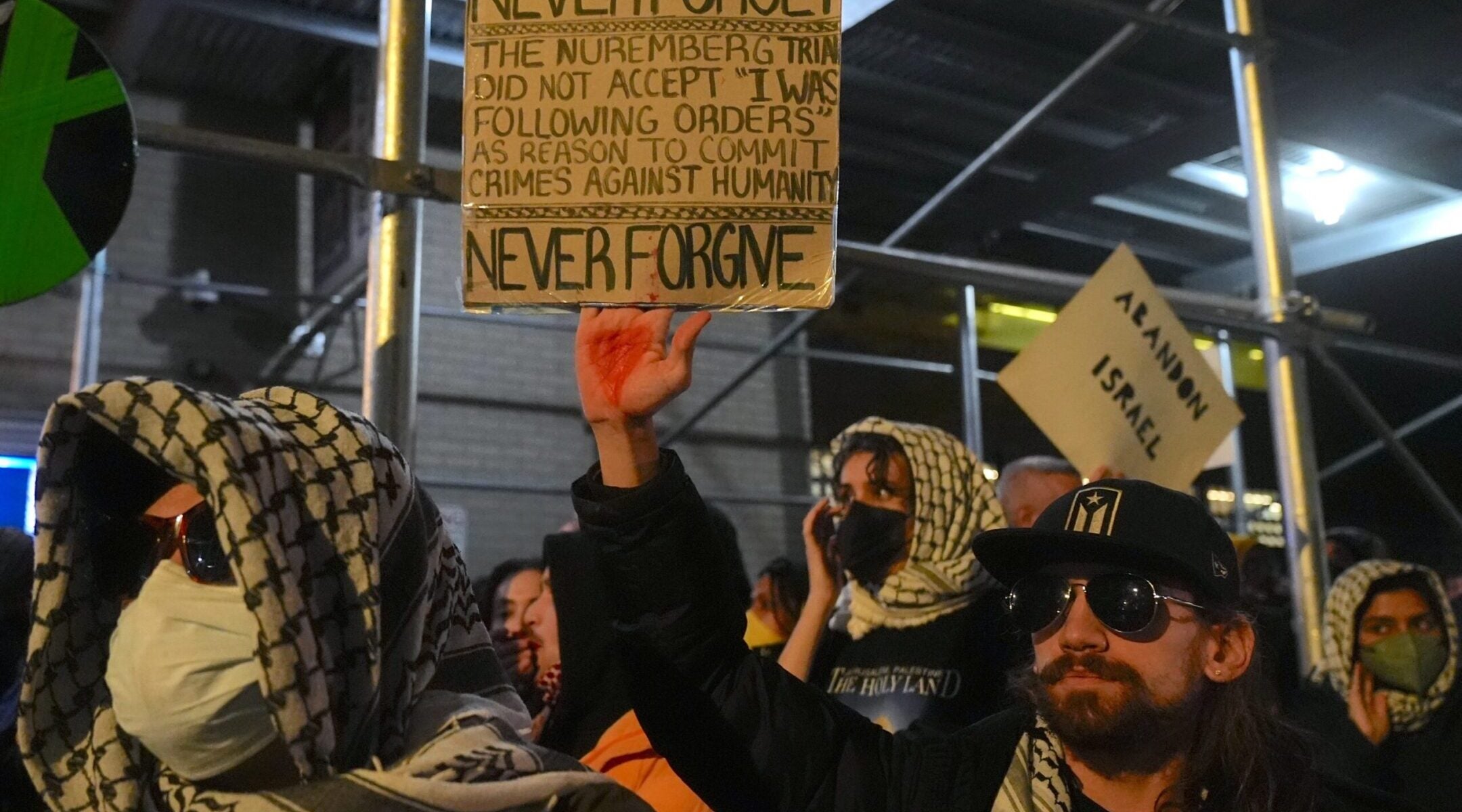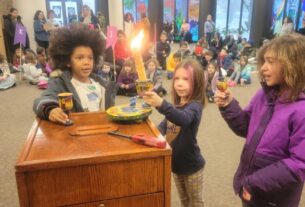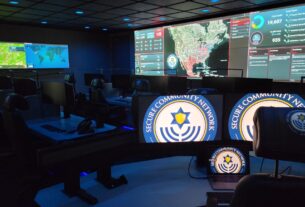Zohran Mamdani, New York City’s mayor-elect, has responded to a protest targeting an event promoting migration to Israel at an Upper East Side synagogue, suggesting that the event was an inappropriate use of a “sacred space.”
The protest on Wednesday night, organized by a group called Palestinian Assembly for Liberation, has drawn allegations of antisemitism from Jewish leaders in the city. During it, participants shouted phrases including “globalize the intifada” and “death to the IDF” as well as insults toward pro-Israel counter-protesters like “f—king Jewish pricks,” according to reports from the scene. Police separated the protesters and counter-protesters but did not halt the demonstration.
“The Mayor-elect has discouraged the language used at last night’s protest and will continue to do so,” Mamdani’s press secretary, Dora Pekec, said in a statement Thursday afternoon.
She went on, “He believes every New Yorker should be free to enter a house of worship without intimidation, and that these sacred spaces should not be used to promote activities in violation of international law.”
Pekec did not offer further comments about whether or why Mamdani believed the event at Park East Synagogue, a prominent Orthodox congregation, promoted violations of international law.
The event was organized by Nefesh B’Nefesh, the nonprofit that facilitates immigration to Israel for North American Jews. The organization bills its open house events as a chance to “get your questions answered, learn about the process, and discover what life in Israel could look like for you and your family.”
Pro-Palestinian protesters gather for a ‘No Settlers on Stolen Land’ protest outside the Park East Synagogue in Manhattan, hosted by Nefesh B’nefesh, an organization that helps American Jews immigrate to Israel, Nov. 19, 2025. (Selçuk Acar/Anadolu via Getty Images)
The group is considered a quasi-governmental agency in Israel, receiving funding from the Israeli government and works closely with its ministries. It does not assign immigrants to particular communities, but has showcased West Bank settlements — which most of the world, though not Israel or the United States, considers illegal under international law — in events and on its website as possible destinations for new immigrants. (Previous protests in New York and beyond have targeted events at synagogues advertising real estate for sale in the West Bank.)
The organizing group suggested that all of the Jews who have moved to Israel with Nefesh B’Nefesh’s support are “settlers,” a term that some pro-Palestinian activists apply to all Israelis, not just those living in the West Bank.
“Nefesh b Nefesh is an affiliate of the Israeli government and the Jewish Agency for Israel, mainly responsible for the recruitment of settlers to Palestine from North America. Since 2003, they have recruited over 80,000 settlers of which over 13,000 served in the IOF,” Palestinian Assembly for Liberation said in an Instagram post advertising its demonstration, using an acronym by which anti-Israel activists refer to the Israeli army as the “Israel Occupation Forces.” It also called El Al “Genocide Settler Airlines.”
The demonstration is providing an early window into how Mamdani’s long- and deeply held pro-Palestinian views might influence his leadership of the city.
As a state Assemblyman, he sponsored legislation aimed at blocking nonprofits from funding Israeli settlements in the West Bank that some, including critics of the settlement movement, decried as casting an overly broad net.
During the campaign, he initially declined to condemn the protest phrase “globalize the intifada,” drawing allegations of antisemitism. He later shifted to say that he would “discourage” the phrase’s use in New York City, saying that he had learned from a rabbi that many Jews interpret it as a call to violence against them.
Now, Mamdani’s response to the Park East demonstration offers a stark contrast to two robust condemnations of antisemitism he has offered up since being elected, after a swastika was painted on a Brooklyn yeshiva and after the words “F–k Jews” were painted on a Brooklyn sidewalk. Both times, he quickly offered a full-throated denunciation on social media.
This time, even as prominent Jewish voices in the city alleged antisemitism on the part of the pro-Palestinian demonstrators, Mamdani did not make a public comment himself. His office’s statement did not address allegations of antisemitism.
Mayor Eric Adams, who is in Uzbekistan after a visit to Israel this week, said in a statement that he planned to visit Park East upon his return to the city. Calling the rhetoric shouted there “desecration,” he suggested that the protest augured a grim future for the city under Mamdani.
“Today it’s a synagogue. Tomorrow it’s a church or a mosque. They come for me today and you tomorrow,” Adams tweeted. “We cannot hand this city over to radicals.”
The event came the same day that Mamdani announced that Adams’ police commissioner, Jessica Tisch, would stay on once he becomes mayor. Tisch, who is Jewish, has previously criticized the conduct of pro-Palestinian protesters in the city.
Rabbi Marc Schneier, who has been staunchly critical of Mamdani and whose father is the longtime senior rabbi at Park East Synagogue, said he was distressed by how the police allowed the confrontation to unfold.
“What I find most disturbing is that the police, who knew about this protest a day in advance, did not arrange for the protesters to be moved to either Third or Lexington Avenues,” he said. “Instead, they allowed the protesters to be right in front of the synagogue, which put members of the community at risk.”
One of the demonstrators repeatedly shouted about the Nefesh B’Nefesh event attendees, “We need to make them scared,” according to video from the scene.
“This kind of intimidation of Jewish New Yorkers is reprehensible and unacceptable,” tweeted Mark Levine, the Jewish comptroller-elect. “No house of worship, of any faith, should be subjected to this.”
Mark Treyger, CEO of the Jewish Community Relations Council of New York, decried the demonstration as “reprehensible.”
“It is not a violation of any law, international or otherwise, for Jews to gather in a synagogue or immigrate to Israel,” he said.
“Using violent rhetoric and hurling antisemitic insults in front of a crowded synagogue was a direct threat to our community’s safety,” he added. “JCRC-NY reached out to city officials and we have confidence that the NYPD will thoroughly investigate this serious matter. No one should ever have to fear entering or leaving their house of worship and that includes our Jewish neighbors. We stand with the Park East community and with all New Yorkers who reject hate.”
In a statement from a spokesperson, UJA-Federation New York said they were “outraged by the demonstration outside Park East Synagogue.”
“We’ve been in contact with our partners at the NYPD, and they are taking this matter very seriously,” the statement reads. “Calls to ‘globalize the intifada’ and ‘death to the IDF’ are not political statements—they are incitements to violence against Jewish people. Every leader must denounce this heinous language, and the choice to target a house of worship makes it especially vile.”
Power the news that matters to you. Before 2025 ends, help (JEWISH REVIEW)’s independent, award-winning newsroom document Jewish history in real-time.




